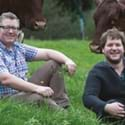The Schoergerer Farm is in the Alpine region of Tyrol in Austria. Run by brothers Stefan and Andreas Lindner, it has 45 hectares of forestry and 45 hectares of grassland grazed by 55 head of young stock.
The cows, a cross of native Austrian Pinzgauer and Red Holstein, have an average yield of 8,000kg a year at 4% fat and 3.3% protein. Animal welfare is a priority at the farm, and the cows are kept comfortable with free access, deep straw-bedded cubicles, rubber walkways, cow brushes and cow showers.
The Lindners are proud of the diversification on their farm. As well as milk production, the brothers produce their own cheese, raise male calves for meat, give tours of the farm and even distill a few drops of schnapps from their fruit trees.
Key areas of sustainable practice
Cows are housed in free stall barns for more freedom of movement and natural behavior expression than cows housed in tie stall barns. The stalls have rubber mattresses and are deep-bedded with straw to improve cow comfort. The dairy housing is enriched with cow brushes and a “cow shower” that sprays a fine water mist containing herbal additives over the cows to improve their thermal comfort in warmer weather. Walkways are made from rubber-covered slats to create a clean, non-slip surface.
Calves are initially housed in individual calf hutches before moving into larger group hutches. The hutches are placed outside to ensure good ventilation and are also protected by a simple roof to provide shade and protection from the weather. Weaned calves and heifers are housed in straw-bedded barns and on slatted rubber to accustom them to the conditions in the dairy herd. Calves and heifers all have access to pasture when weather conditions permit. Heifers over seven months of age are kept on Alpine pasture during the summer.
The farm is focused on adding value to its milk and the brothers are producing their own cheese, which they market locally. The male dairy calves are reared to three months old (~140kg) and then slaughtered to produce rose veal that is also sold to shops, hotels and restaurants in the area.
The Lindner brothers’ sister owns a hotel locally that gives them the opportunity to engage with visitors to the region, running regular farm tours for hotel guests and other visitors. The hotel is a primary outlet for the farm’s cheese and rose veal, as well as the schnapps from their fruit trees, which is sold in the hotel.
The alpine pastures and forests are very important for promoting biodiversity and soil structure on steep terrain. Among the farm’s land management initiatives are the planting of fruit trees to create pollinator habitats and late cutting of grass for hay crops on some fields to allow plants to flower and seed.
The Lindner brothers are very careful to manage the different land types on the farm to ensure that their integrity is maintained. There is also the use of legumes in grassland to fix atmospheric nitrogen and improve soil structure.
Learn more about Stefan and Andreas Lindner’s story
Explore the case study, where you’ll find extra details on how they’ve performed against the program’s good practice standards and criteria, what external research reveals about their actions and how improved sustainability benefits them.

“We want to show others in our industry that diversifying, adopting high environmental and ethical standards, and engaging with one another is the best way to progress in the farming and agricultural business. We also want to be able to show consumers how farmers nowadays are working, how they run their business, and what they are doing for the environment, for their animals and for the public.”
“The Schoergerer Farm is a great example of how a proactive approach, along with a willingness to diversify, can create a successful farming business. Creating value-added products, marketing their own produce and capitalizing on the local tourist trade provide the farm with a diverse income stream. They have invested in systems which provide for the animals’ comfort and behavioral needs, which the Lindner brothers are happy to showcase to their customers through farm tours. The Lindner brothers are in a great position to have a positive influence on the public’s view of farming while publicizing the benefits of sustainability to the dairy industry.”


